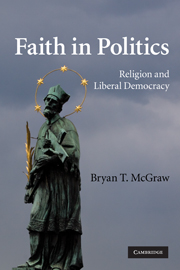Book contents
- Frontmatter
- Contents
- Acknowledgements
- Introduction
- 1 Europe's religious parties and the liberal consensus
- 2 The argument for deliberative restraint
- 3 The problem with secular reasons
- 4 Public reason and religious conflict
- 5 Religion and the problem of political autonomy
- 6 Making the most of conflict: religion and political toleration
- Conclusion: toward a better sort of liberal democracy
- Bibliography
- Index
5 - Religion and the problem of political autonomy
Published online by Cambridge University Press: 05 June 2012
- Frontmatter
- Contents
- Acknowledgements
- Introduction
- 1 Europe's religious parties and the liberal consensus
- 2 The argument for deliberative restraint
- 3 The problem with secular reasons
- 4 Public reason and religious conflict
- 5 Religion and the problem of political autonomy
- 6 Making the most of conflict: religion and political toleration
- Conclusion: toward a better sort of liberal democracy
- Bibliography
- Index
Summary
In the previous three chapters, I argued that the liberal concern regarding religion's political engagement and its effects on political legitimacy were overdrawn and that religious political mobilization could actually serve to buttress, not undermine, pluralist democracies. Democratic political legitimacy cannot depend on deliberative restraint, since restraint's moral claims are both unpersuasive on their own terms and dependent on unsustainable empirical claims. Key to my argument was my comparison of how some European religious political movements affected their respective countries' democratic prospects in the late nineteenth and early twentieth centuries. One way in which the more democratically beneficial movements in Germany, Belgium, and the Netherlands resembled one another was their penchant for constructing networks of affiliated churches, newspapers, trade unions, schools, and the like, creating “alternative civil societies” that functioned as a strategy of “subcultural encapsulation.” This strategy was meant to protect against what they saw as the corrosive acids of modernity and to organize their social and cultural lives in ways reflective of what they thought their particular faith demanded. They sought to create, and largely succeeded, a subcultural order “integrated” around their faith.
What emerged in these cases were democratic societies marked by “segmented pluralism,” where the various groups of citizens united around a powerful attachment to what Rawls might call “comprehensive doctrines” were allowed the opportunity to create their own, similarly organized, networks, the most developed of which was the Dutch pillarization.
- Type
- Chapter
- Information
- Faith in PoliticsReligion and Liberal Democracy, pp. 176 - 217Publisher: Cambridge University PressPrint publication year: 2010

